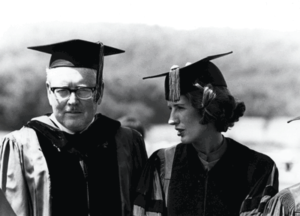
Nancy Maginnes Kissinger speaks to former Lehigh president W. Deming Lewis at the Class of 1977 commencement ceremony. Maginnes was the first woman to be elected to the board of trustees in 1977. (Courtesy of Lehigh University website)
Lehigh’s first graduating class could all fit comfortably in a minivan.
Only six students graduated from the university in 1869. Most were from the Lehigh Valley. All were male.
The students who graduated in June 1869 had completed several years of six-day workweeks, which began each morning in the Packer Memorial Church. There, Henry Coppée, the university’s first president, led all students in prayer.
Each undergraduate student was required to write a thesis to earn his degree. Clarence Wolle, a member of the class of 1869, wrote that the process took place in front of “quite an audience of interested people from Bethlehem” who weren’t afraid to question the students’ work.
“The examination was almost cruelly rigid,” Wolle wrote, “but so thorough were the subjects studied that not a single error was made by the whole class.”
According to Register, a publication that laid out expectations for Lehigh’s earliest students, the university’s campus was less than a tenth of today’s thousand-acre sprawl across South Mountain, with only around 70 acres of developed land to Lehigh’s name.
Christmas-Saucon Hall already stood on campus, housing the university’s first classes, and Packer Hall had just opened.
Greek life had not yet arrived on campus, but a chapter of Phi Sigma Kappa fraternity would be established later that fall. The students were prohibited from drinking or smoking on campus, and, according to Register, were required to open their doors for inspection whenever the president or instructors deemed it necessary.
And 147 years later, the Lehigh experience has evolved, culminating in this year’s May 22 commencement program at Goodman Stadium.
Certain components of the university’s founding and early years still remain in Lehigh’s commencement exercises. An invocation is still delivered each year to open the event, a callback to the university’s religious past.
The faces of the students under the graduation caps have also changed, with the first women crossing the stage in 1921. That year, Bessie Edna Kast, ‘21G, Mary Alice Schwaninger, ’21G, and Edna Grace Tatnal, ’21G, received their master’s degrees from the university.
Half a century later, the first female undergraduate students would enroll, with 169 women stepping foot on campus in 1971. A few years later, the first female class president, Susan M. Bschorr, ’77, would provide remarks to her graduating class at commencement.
This year’s ceremony will see another woman address the Lehigh community, with Stephanie Ruhle, ’97, as the commencement speaker.
The podium Ruhle will stand behind May 22 has also supported the likes of Bill Nye, Elie Wiesel and Maya Angelou. In 1987, Bill Cosby gave the commencement address and received an honorary degree from the university. The degree would be revoked in 2015.
President Donald Trump was awarded an Honorary Doctor of Laws Degree after giving the commencement address in 1988. Despite concerns from faculty and the Lehigh community about whether the president’s actions violated Lehigh’s Principles of an Equitable Community, Trump continues to hold the degree today.
As the number of students attending the university has grown, so has security for the event. Lehigh Police Chief Edward Shupp said, of all university events throughout the year, graduation has the largest number of officers present.
“You’re just going to have the biggest number of spectators in attendance,” Shupp said. “We have all officers available on-site to keep members safe.”
Shupp estimated up to 30 officers from LUPD and neighboring police departments can be present at commencement. This number has increased from past years in light of the rising enrollment.
The growth of Lehigh’s student body has also affected the location of commencement. After outgrowing Memorial Church, commencement exercises moved at one point to the former Taylor Stadium before shifting to other locations like Stabler Arena and today’s Goodman Stadium.
Connie Forsyth, a longtime resident of South Bethlehem, said she missed being able to attend commencement at Taylor Stadium. Although she said the distance to Goodman Campus is not too great, she still feels somewhat separated from the ceremony now.
“When they graduated at Taylor, it might as well have been in your backyard,” Forsyth said. “It’s different now, more removed. It’s another connection we don’t have with Lehigh anymore.”
Forsyth pointed out that the university was originally created with young residents of Bethlehem in mind, and she wished she could see more of a local population in today’s enrollment.
“The first kids who came here, they stuck around after graduation,” Forsyth said. “Now we don’t even see them graduate.”
On May 22, nearly 1,000 undergraduate students will graduate from Lehigh as the Class of 2017. Their mornings didn’t begin with mass led by President John Simon and their senior years didn’t culminate in a thesis presentation before a crowd of Bethlehem residents. Still, they will leave the university through the commencement ceremony that forever joins them to the graduates of the past and the first to leave South Mountain as alumni.





Comment policy
Comments posted to The Brown and White website are reviewed by a moderator before being approved. Incendiary speech or harassing language, including comments targeted at individuals, may be deemed unacceptable and not published. Spam and other soliciting will also be declined.
The Brown and White also reserves the right to not publish entirely anonymous comments.
1 Comment
“Principles of an Equitable Community” ?
Is this meant to be said with a straight face?